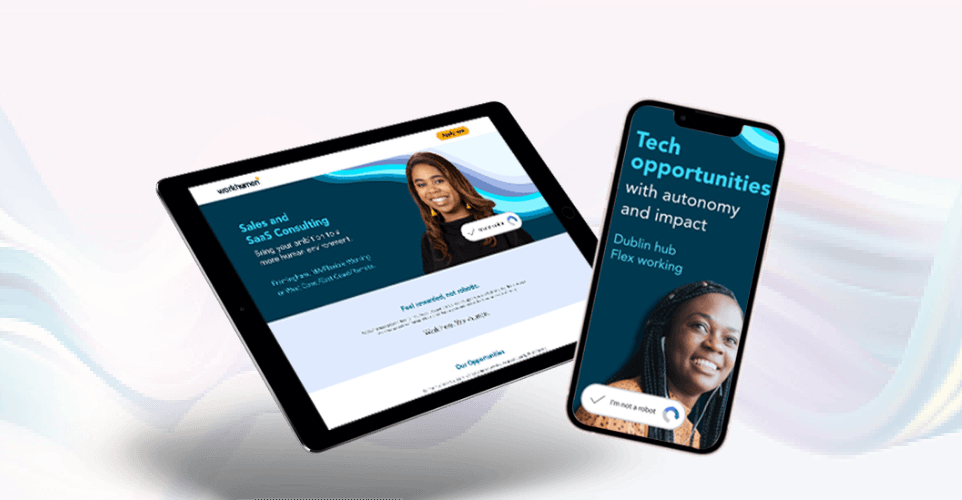When it comes to business and the jobs market, the coronavirus crisis has undoubtedly caused more harm than good. However, when it comes to the hiring process, recruitment strategies and even company cultures, there are some positives that we can take from this crazy, turbulent year. These changes look like they may be here to stay which means while the talent acquisition industry is currently in rocky waters, there’s a light at the end of the tunnel, and both the candidate and recruiter experience will be made better for years to come.
While the pandemic doesn’t seem to be going anywhere any time soon, it’s very easy to be caught up in the doom and gloom. We thought we’d be a little more optimistic and look at some of the things which have changed for the better. Some of these aspects have been a long time coming while others have taken the world of talent acquisition by storm.
Don’t believe us? Take a look for yourself:
Flexible Working
You’re probably sick of hearing about how this year has seen a revolution in remote work, with countless debates about whether we’ll ever return to the office on a full-time basis again. However, we can’t ignore that embracing flexible working provides a huge positive for employers and employees alike. The COVID-19 crisis meant we all had to adapt to remote working swiftly, which for some businesses like startups proved to be no problem, but others had a lot of changes to make. However, once we all got used to zoom meetings, working from our kitchen tables and no commuting; many businesses saw the advantages. Flexible working leads to happier and more productive employees which has many benefits to employer brands and businesses as a whole. It’s been reported to lead to less sick days and absences but also shows employers prioritise their employees over anything else. They care about their employees’ needs and know that being able to balance their personal lives with work will help their mental health and overall wellbeing.
Wider Talent Pools
Due to the rise in remote working, employers can cast a wider net when it comes to searching for the best talent. Location is no longer an issue for many, as long as the individual has a strong internet connection and can be available during at least some of your working hours, then they can get the job done. With offices being made more redundant, the talent pool becomes more expansive, which opens up a more diverse and exciting range of talent. Without being limited by geography, businesses can find talented people that are perfect for their company rather than the most skilled person in their area. This should improve employee retention and engagement as you can hire people that are genuinely passionate about what you do.
Embracing Automations
For years recruiters and HR managers alike have been discussing automations and how they can help to streamline the recruitment process. However, who knew it would take a global pandemic for us all to embrace them? Due to large numbers of applicants and often a reduced number of staff, many recruiters have had to rely on automation tools to complete time-consuming admin tasks.
Also, due to the Black Lives Matter Movement and the movement which has prioritised diversity and inclusion in workplaces, many recruiters have chosen to automate parts of their recruitment process in the hopes of eliminating bias. AI and automations can help with candidate screening, removing chances of unconscious bias and improving opportunities for diversity. Using algorithms to help screen candidates can help to make the recruitment process blind but also speeds up the entire process. We should point out though; there have been some issues with AI being influenced by past data or the humans that create the algorithms. Therefore, businesses should be mindful of bias in the recruitment process even if they adopt AI tools.
Quicker Hiring Process
Virtual interviews are taking over. At first, none of us wanted to interview candidates through a computer screen; it didn’t feel very personal. It’s harder to develop human connections and read a candidate’s body language if you don’t meet them in person. However, we soon realised that video interviews save a lot of time and resource; it’s a much quicker process and can mean that your team members don’t have to take whole days out to meet candidates for one vacancy.
For many businesses, the pandemic also brought about a sense of urgency when it came to hiring. Businesses like tech startups, pharmaceutical companies and even online retailers saw a surge in demand as the world went into lockdown, which meant they needed to hire people quickly to help them meet it. This meant that many employers embraced a speedier recruitment process and realised the value in hiring rapidly. A quicker hiring process improves the candidate experience and means that when there is an urgent need, business can largely carry on as usual.
Better Onboarding Process
As many businesses have shifted to remote working, the onboarding process for new candidates has come under a lot of scrutiny in the last year. Priorities shifted, and it suddenly became about how to make a new hire feel welcome and translate your friendly company culture when working remotely. The onboarding process is a vital HR process that so often is ignored or overlooked; other things take priority. However, when your employees aren’t in the office, it’s more important than ever that your new hires feel welcome and can gain an understanding of who you are as an employer, so they know what to expect when they eventually return to the office. Therefore, if COVID-19 has taught us anything, it’s to appreciate the importance of employee onboarding and to ensure that a robust and carefully thought out strategy is in place.
Changed leadership attitudes
It’s not just the recruitment and onboarding process that the pandemic has altered for the better; it’s also changed some attitudes to leadership, which will have positive implications on employer brands in the future. Leaders realised during this pandemic that it pays to be transparent and open, especially in the era of social media as any discrepancies are called out pretty quickly. It means that many companies are taking a more transparent approach to leadership; employees are kept in the loop and feel more involved in the business. This approach is excellent for employer branding, as employees feel more loyalty to their employer.
Also, the pandemic has shown many employers that people are what makes a business special. As clichéd as it sounds, they are a company’s most valuable asset. Therefore, business leaders across a range of industries have taken a people-first approach to manage their business. Employees are more valued now than ever before, and employers realise that to retain their best talent and to attract new candidates, it’s vital to ensure employees are happy. With the power of social media and the growing connection between employer brand and consumer brand, employees have an increasing amount of influence and power. If employees are happy, feel supported and are encouraged to learn or progress, it will positively influence how your employer brand is seen externally. This is precisely why employers are increases their efforts when it comes to the employee experience; from investing in wellness initiatives and benefits to taking on board employee feedback.
While we cannot tell how long this pandemic will last, we can draw some positives from the chaos. The world of recruiting, like many other industries, will have changed forever as an outcome of COVID-19, but we’re optimistic that some of these changes will be for the better. From improving the candidate experience and giving employees more power to changing your company culture in a way that will enhance employer brands; recruitment and the employee experience will never be the same.
For advice on how to implement any of these changes within your business, get in touch with our recruitment experts and start your conversation.








